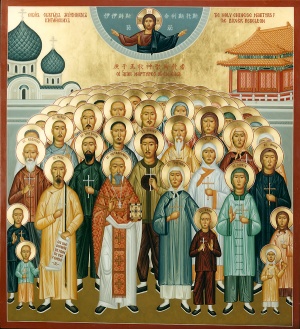Difference between revisions of "Martyrs of China"
m (see also) |
|||
| Line 22: | Line 22: | ||
===Ioann=== | ===Ioann=== | ||
Ioann (John) was only eight years old at the time. On the evening of June 11th, when Fr. Mitrophan was killed, the Boxers split Ioann's shoulders and severed his toes. His brother Isaiah's bride managed to save him from death by hiding him in a latrine. In the morning he sat at the entrance without clothes and shoes, and when people asked "are you hurting?" he answered “it doesn't hurt." Boys scoffed at him, calling him a “child of demons | Ioann (John) was only eight years old at the time. On the evening of June 11th, when Fr. Mitrophan was killed, the Boxers split Ioann's shoulders and severed his toes. His brother Isaiah's bride managed to save him from death by hiding him in a latrine. In the morning he sat at the entrance without clothes and shoes, and when people asked "are you hurting?" he answered “it doesn't hurt." Boys scoffed at him, calling him a “child of demons | ||
| + | |||
| + | ==See also== | ||
| + | *[[Russian Orthodox Mission in China]] | ||
==External Links== | ==External Links== | ||
Revision as of 18:26, September 13, 2008
Contents
Lives
Priest Mitrophan
The priest Mitrophan (also Metrophanes), whose Chinese name was Ji chong or Tsi Chung (the English transliterations vary), was born on December 10, 1855. He lost his father in early childhood and was raised under the care of his grandmother Ekaterina and his mother Marina; his mother was a teacher at a school for women. At this time he experienced many troubles. When Archimandrite Pallady became head of the mission for the second time, he charged his teacher Juren Long Yuan to take great care in educating Mitrophan, in order to prepare him for his eventual ordination. Before reaching twenty years of age, he was appointed to the post of catechist. At 25 he was ordained to the priesthood by Nikolai, bishop of Japan.
Mitrophan was a humble person, very cautious and quiet, peaceful and dispassionate; even when faced with great insults, he did not try to justify himself. From the time of his arrival in Beijing (北京, Peking), Archimandrite Pallady charged Mitrophan, as did his teacher Long Yuan, to try to attain the priesthood. Mitrophan, however, did not want to accept ordination and constantly refused it, saying "how can a person with insufficient abilities and charity dare to accept this great rank?" But under the forceful urging of Archimandrite Flavian, succesor to Pallady, and the persuasion of the teacher, Mitrophan obeyed, even though he knew that by accepting the priesthood, his end would be inevitable. Under Archimandrite Flavian, Mitrophan assisted in translating and checking books. For fifteen years, he tirelessly served God while suffering many hurts and insults, both from his own people and outsiders. He finally had a mild breakdown. Sometime after this he spent three years living outside the mission, receiving half of his previous salary. All his life Father Mitrophan was never greedy, and many took advantage of this.
Martyrdom
On the evening of June 1, 1900 (which was the 17th day of the 5th month on the Chinese calendar)1, the Boxers burned the buildings of the mission. About seventy Christians, hiding from danger, assembled in St Mitrophan's home. Although Fr. Mitrophan's former ill-wishers were among them, he did not drive them out. Seeing that some people were dispirited, he strengthened them, saying that the time of troubles had come and would be difficult to avoid. He himself several times daily went to look at the burned church. On the 10th of June, towards 10 in the evening, soldiers and Boxers surrounded Fr. Mitrophan's dwelling. Up to seventy Christians were there at the time; the stronger among them fled, while Fr. Mitrophan and many others, primarily women and children, remained and were tortured. Fr. Mitrophan sat in his courtyard when the Boxers punctured his chest, and he fell under a date tree. His neighbors removed his body to the mission's almshouse. Later the hieromonk Avraamy picked up Fr. Mitrophan's body and, in 1903, during the first commemoration of the martyrs, it and those of the others, were placed under the altar in the martyrs' church.
Fr. Mitrophan’s family members were also tortured; they included his wife Tatiana and his three sons: the eldest, named Isaiah; the second, called Sergiy, a priest; and the third, Ioann.
Tatiana
On June 11th Tatiana was saved from the Boxers with help from her son Isaiah's bride, but on the following morning, June 12th, she was seized along with 19 others and sent to Xiaoyingfang, where the Boxer camp was located, and was finally executed by beheading. An almshouse for the poor now stands on the place of her execution.
Isaiah
Isaiah had served in the military for 23 years. On June 7th, the Boxers beheaded him because he was known to be a Christian.
Ioann
Ioann (John) was only eight years old at the time. On the evening of June 11th, when Fr. Mitrophan was killed, the Boxers split Ioann's shoulders and severed his toes. His brother Isaiah's bride managed to save him from death by hiding him in a latrine. In the morning he sat at the entrance without clothes and shoes, and when people asked "are you hurting?" he answered “it doesn't hurt." Boys scoffed at him, calling him a “child of demons
See also
External Links
Categories > Church History
Categories > Church History
Categories > Church History
Categories > Church History
Categories > Liturgics > Feasts
Categories > Liturgics > Feasts
Categories > Liturgics > Feasts
Categories > People > Saints
Categories > People > Saints > Martyrs
Categories > People > Saints > Saints by century > 19th-century saints
Categories > Places > Orthodoxy by country > Orthodoxy in China

